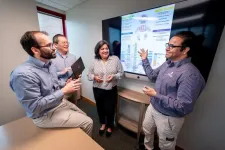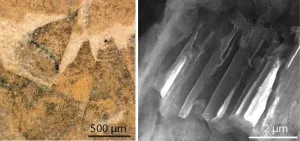(Press-News.org) A drug that was developed to treat pancreatic cancer has now been shown to increase symptom-free survival in preclinical medulloblastoma models – all without showing signs of toxicity.
Medulloblastoma is the most common malignant brain tumor in children. Survival rates vary according to which one of the four subtypes a patient has, but the worst survival rates, historically at about 40%, are for Group 3, which this research focused on.
Jezabel Rodriguez Blanco, Ph.D., an assistant professor who holds dual appointments at MUSC Hollings Cancer Center and the Darby Children’s Research Institute at MUSC, led the research, published in the Journal of Clinical Investigation.
Her research focused on the drug triptolide, which is extracted from a vine used in traditional Chinese medicine, and its water-soluble prodrug version, Minnelide. A prodrug is an inactive medication that the body converts into an active drug through enzymatic or chemical reactions.
MYC is an oncogene, or gene that has the potential to cause cancer. MYC is dysregulated, or out of control, in about 70% of human cancers, and it shows up in much higher levels in Group 3 medulloblastoma than in the other medulloblastoma subgroups. Despite its well-known role in cancer, this oncogene historically has been considered impossible to target with drugs.
Despite its poor druggability, previous research in other cancers had shown that triptolide and its derivatives had the ability to target MYC. When Blanco was still a postdoctoral fellow at the University of Miami, her mentor, David Robbins, Ph.D., attended a presentation by the research team that showed that the more copies of MYC that a tumor has, the better that triptolide works.
“He came to me, and he told me, ‘You know, as Group 3 medulloblastoma has many MYC copies, you should get some research models and try the drug,” Blanco recalled. She started the project from scratch. “I started talking to people, getting cell lines and animal models, learning how to propagate them, getting the drug, using it.”
Blanco received a three-month grant intended for cancer center trainees to develop ideas. Then her lab at the time was awarded a one-year grant from the Southeastern Brain Tumor Foundation in 2018. Since then, she’s received no additional funding specific to this project. Even as she started her faculty position at MUSC and began to focus most of her research on the Sonic Hedgehog subgroup of medulloblastoma, she continued to work on the Group 3 research as a side project. She knew how well triptolide was working in these hard-to-treat tumors, and she did not want her initial results to fall through the cracks.
Determining the mechanism of action has been the most challenging part of the project, she noted, due to the drug’s multiple effects, and there could still be additional mechanisms beyond those that Blanco identified.
“It was affecting MYC gene expression by affecting the RNA pol II activity, and then it was affecting how long the protein lasts. So, the fact that it's working through two different mechanisms on this oncogene may explain why it's so effective in tumors that have extra copies of MYC,” she said, explaining that RNA polymerase II is a protein that helps to make copies of DNA instructions, which are used to produce proteins in the cell.
Despite the challenges of narrowing down the mechanism of action specific to the cancer, it was quite clear that however it worked, it did work, she said.
The efficacy was 100 times higher in the Group 3 tumors with extra MYC copies than in the Sonic Hedgehog tumors with normal levels of MYC, she said. She found that Minnelide reduced tumor growth and the spread of cancer cells to the thin tissues that cover the brain and spinal cord, called leptomeninges. It also increased the efficacy of the chemotherapy drug cyclophosphamide, which is currently used in treatment.
Blanco decided to move forward with publication rather than waiting to write a manuscript that answered all possible questions. Knowing that most parents whose children receive a Group 3 medulloblastoma diagnosis will lose their child in less than two years was the incentive she needed to push this work out.
“There was a point at which I could not hold these data anymore because it was working so well that it needed to go out,” she said. “The preclinical models were showing such a nice efficacy that it was like, ‘OK, I cannot keep on holding this work, digging deeper into the mechanism of action because the kids that have Group 3 medulloblastoma are dying while we are doing those experiments.”
Minnelide has been tested or is currently in testing in phase I and phase II clinical trials of adults with different types of cancer, including pancreatic cancer, where it showed some efficacy.
Blanco is hopeful that, with this new research on Group 3 medulloblastoma, a clinical trial for children with this disease can be launched.
Her paper is dedicated to the memory of Insley Horn, a 9-year-old Charleston girl who succumbed to one of these aggressive brain tumors. Research, Blanco said, is the only tool we have to prevent the loss of lives like Insley’s.
The content is solely the responsibility of the authors and does not necessarily represent the official views of the National Institutes of Health.
About MUSC Hollings Cancer Center
MUSC Hollings Cancer Center is South Carolina’s only National Cancer Institute-designated cancer center with the largest academic-based cancer research program in the state. The cancer center comprises more than 140 faculty cancer scientists and 20 academic departments. It has an annual research funding portfolio of more than $50 million and sponsors more than 200 clinical trials across the state. Dedicated to preventing and reducing the cancer burden statewide, the Hollings Office of Community Outreach and Engagement works with community organizations to bring cancer education and prevention information to affected populations. Hollings offers state-of-the-art cancer screening, diagnostic capabilities, therapies and surgical techniques within its multidisciplinary clinics. Hollings specialists include surgeons, medical oncologists, radiation oncologists, radiologists, pathologists, psychologists and other clinical providers equipped to provide the full range of cancer care. For more information, visit hollingscancercenter.musc.edu.
END
Drug developed for pancreatic cancer shows promise against most aggressive form of medulloblastoma
2024-08-01
ELSE PRESS RELEASES FROM THIS DATE:
Retreat of tropical glaciers foreshadows changing climate's effect on the global ice
2024-08-01
MADISON — As they are in many places around the globe, glaciers perched high in the Andes Mountains are shrinking. Now, researchers at the University of Wisconsin–Madison and their collaborators have uncovered evidence that the high-altitude tropical ice fields are likely smaller than they've been at any time since the last ice age ended 11,700 years ago.
That would make the tropical Andes the first region in the world known to pass that threshold as a result of the steadily warming global climate. It also makes them possible harbingers of what's to come for glaciers globally.
"We think these are the canary ...
St. Jude gene panel for pediatric cancers increases access to high-quality testing
2024-08-01
Scientists at St. Jude Children’s Research Hospital have created a panel that is able to provide a diagnosis for >90% of pediatric cancer patients by sequencing 0.15% of the human genome. The panel is a cost-effective way to test and classify childhood malignancies and to help guide patient treatment. The panel’s performance and validation were published this week in Clinical Cancer Research.
Finding the mutations in a child’s cancer with powerful sequencing technology can lead to better outcomes. Physicians use that knowledge to tailor targeted treatments to the specific cancer-causing mutations affecting each patient. However, current ...
Health insurers have required prior authorization for services for decades—but have they treated patients equitably?
2024-08-01
Prior authorization—the process by which a health insurance company denies or approves coverage for a health care service before the service is performed—became standard practice beginning with Medicare and Medicaid legislation in the 1960s.
Although research has uncovered disparities in prior coverage for cancer patients based on race, little has been known to date on the role of prior authorization in increasing or decreasing these disparities.
To learn more about the issue, Benjamin Ukert, PhD, an assistant professor of health policy and management in the Texas A&M ...
Trying to limit calories? Skip the dip, researchers advise
2024-08-01
UNIVERSITY PARK, Pa. — Snacks provide, on average, about one-fourth of most people’s daily calories. With nearly one in three adults in the United States overweight and more than two in five with obesity, according to the National Institutes of Health, researchers in the Penn State Sensory Evaluation Center are investigating how Americans can snack smarter.
The latest study conducted in the center, housed in the College of Agricultural Sciences, investigated how eating behavior changes when consumers are served a dip with a salty snack. The findings, available online now and to be published in the November issue ...
Innovation Crossroads welcomes seven entrepreneurs for Cohort 2024
2024-08-01
Seven entrepreneurs comprise the next cohort of Innovation Crossroads, a Department of Energy Lab-Embedded Entrepreneurship Program node based at Oak Ridge National Laboratory. The program provides energy-related startup founders from across the nation with access to ORNL’s unique scientific resources and capabilities, as well as connect them with experts, mentors and networks to accelerate their efforts to take their world-changing ideas to the marketplace.
“Supporting the next generation of entrepreneurs is part of ORNL’s ...
American College of Rheumatology opens press registration for ACR Convergence 2024
2024-08-01
FOR IMMEDIATE RELEASE
Aug. 1, 2024
Media Contact:
Monica McDonald
(404) 365-2162
mmcdonald@rheumatology.org
American College of Rheumatology Opens Press Registration for ACR Convergence 2024
ATLANTA – Complimentary press registration is now open for journalists to cover research presented at ACR Convergence 2024, taking place Nov. 14-19 at the Walter E. Washington Convention Center in Washington, D.C. A listing of sessions for the meeting can be found in the online program.
Approved ...
Half a billion-year-old spiny slug reveals the origins of mollusks
2024-08-01
UNDER EMBARGO UNTIL 19:00 BST / 14:00 ET THURSDAY 1 AUGUST 2024
Images available via link in the notes section
Exceptional fossils with preserved soft parts reveal that the earliest molluscs were flat, armoured slugs without shells.
The new species, Shishania aculeata was covered with hollow, organic, cone-shaped spines.
The fossils preserve exceptionally rare detailed features which reveal that these spines were produced using a sophisticated secretion system that is shared with annelids (earthworms and relatives).
A team of researchers including scientists from the University of Oxford have made an astonishing discovery of ...
Award-winning research maps the body’s internal sensory communication highway
2024-08-01
When the question is “how are you feeling on the inside?,” it’s our vagus nerve that offers the answer.
But how does the body’s longest cranial nerve, running from brain to large intestine, encodes sensory information from the visceral organs? For his work investigating and mapping this internal information highway, Qiancheng Zhao is the 2024 grand prize winner of the Science & PINS Prize for Neuromodulation.
Interoception—the body’s ability to sense its internal state in a timely and precise manner—facilitated by the vagus plays a key role in respiratory, gastrointestinal, cardiovascular, endocrine and immune ...
Current Andean glacier loss is unprecedented in the Holocene
2024-08-01
Andean tropical glaciers are experiencing unprecedented retreat, according to a new study that reveals their current sizes are the smallest in over 11,700 years. “Our finding … identifies this region as a hot spot in our understanding of the changing state of the cryosphere,” say the authors. Glaciers act as important indicators of climate change, with their global retreat accelerating over recent decades. Examining this retreat in the context of the previous 11,700 years of the Holocene interglacial highlights the impact of modern global warming. Although many glaciers worldwide are smaller today compared to ...
New fossil resembling a bristly durian fruit reveals insights into the origin of molluscan skeletons
2024-08-01
The early evolution of mollusks has been hard to pin down, but now a newly discovered fossil – of a shell-less, soft-bodied, spiny mollusk from the early Cambrian – provides crucial insights, researchers report. The findings suggest that this fossil, of a creature called Shishania aculeata, is a stem mollusk – representative of an intermediate between early members of the superphylum lophotrochozoans and more derived mollusks. Mollusks are one of the most diverse groups of animals, encompassing various well-known forms such as clams, ...





